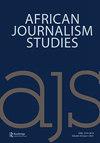走向新闻正义:规范序曲
IF 1.8
3区 文学
Q3 COMMUNICATION
引用次数: 0
摘要
在思考非洲新闻如何更好地为社会服务时,人们必须关注人类今天发现自己的时刻。可以说,当代社会最紧迫的问题之一是社会正义,而同样强大的恶性力量COVID-19大流行的掠夺力量暴露了社会正义的层面。鉴于媒体作为社会变革载体的关键作用,必须评估当代新闻在促进社会向公正结构转变方面的潜力。本文认为,道德冷漠的客观主义新闻的局限性和“纠正性新闻”的狭隘焦点不足以满足当代社会多维和错综复杂的正义问题的要求。借鉴弗雷泽的正义理论和克伦肖的交叉理论,以及对在线新闻平台“新框架”和“非洲对话”的实证制度分析,本文认为,面向正义的新闻将为在地方和国际层面上对现存的、新兴的和错综复杂的社会正义问题进行细致的论述提供最佳工具。本文章由计算机程序翻译,如有差异,请以英文原文为准。
Towards a Journalism for Justice: A Normative Overture
ABSTRACT In thinking about how African journalism can serve society better, one has to pay attention to the moment in which humanity finds itself today. Arguably one of the most exigent issues in contemporary society is that of social justice, whose dimensions have been exposed by the denudational forces of an equally potent malignant force, the COVID-19 pandemic. Given the crucial role of the media as a vector of social change, an appraisal of contemporary journalisms’ potency in fostering the transformation of society towards a just configuration is imperative. This article argues that the limitations of the morally indifferent objectivist journalism and the parochial focus of “corrective journalisms” are not adequate to meet the demands of multidimensional and imbricated justice questions in contemporary society. Drawing on both Fraser’s Justice Theory and Crenshaw’s Intersectional Theory as well as an empirical institutional analysis of the online journalism platforms New Frame and The Conversation Africa, this article argues that a journalism that is oriented towards justice would provide the optimum tools for nuanced discourses on extant, emerging and imbricated questions of social justice at both the local and international levels.
求助全文
通过发布文献求助,成功后即可免费获取论文全文。
去求助
来源期刊

African Journalism Studies
COMMUNICATION-
CiteScore
1.90
自引率
10.00%
发文量
18
期刊介绍:
Accredited by the South African Department of Higher Education and Training for university research purposes African Journalism Studies subscribes to the Code of Best Practice for Peer Reviewed Scholarly Journals of the Academy of Science of South Africa. African Journalism Studies ( AJS) aims to contribute to the ongoing extension of the theories, methodologies and empirical data to under-researched areas of knowledge production, through its emphasis on African journalism studies within a broader, comparative perspective of the Global South. AJS strives for theoretical diversity and methodological inclusivity, by developing theoretical approaches and making critical interventions in global scholarly debates. The journal''s comparative and interdisciplinary approach is informed by the related fields of cultural and media studies, communication studies, African studies, politics, and sociology. The field of journalism studies is understood broadly, as including the practices, norms, value systems, frameworks of representation, audiences, platforms, industries, theories and power relations that relate to the production, consumption and study of journalism. A wide definition of journalism is used, which extends beyond news and current affairs to include digital and social media, documentary film and narrative non-fiction.
 求助内容:
求助内容: 应助结果提醒方式:
应助结果提醒方式:


